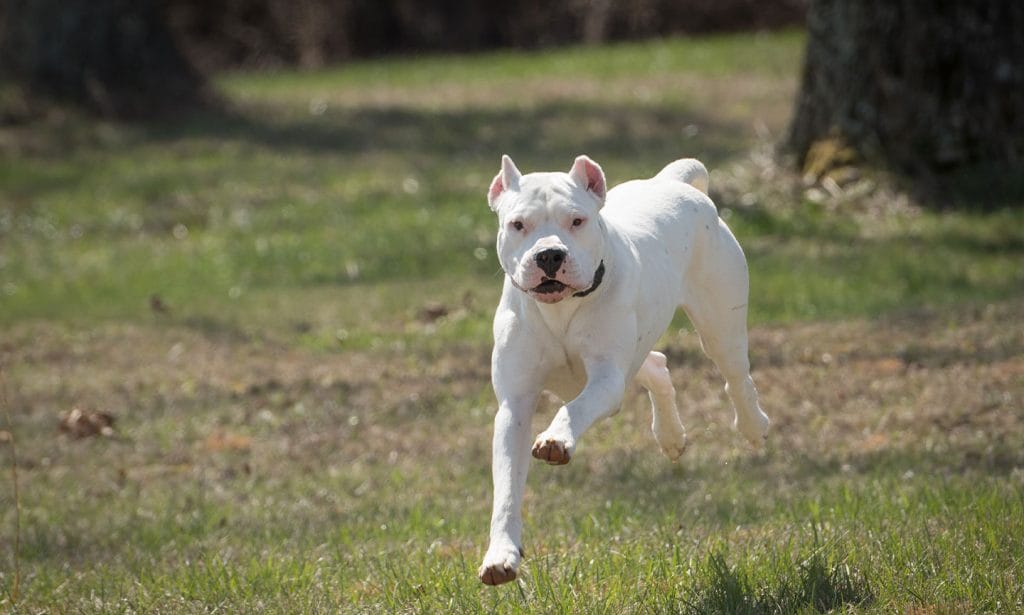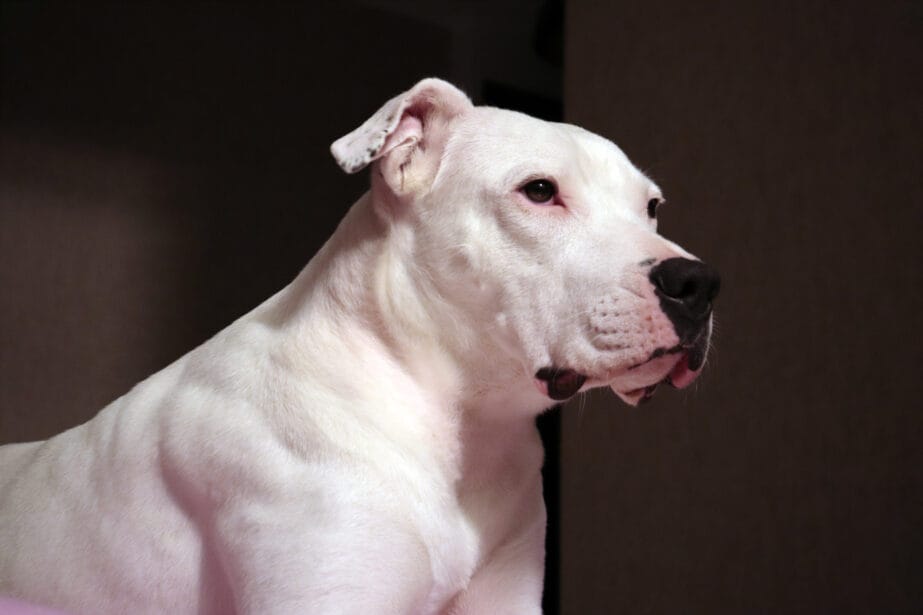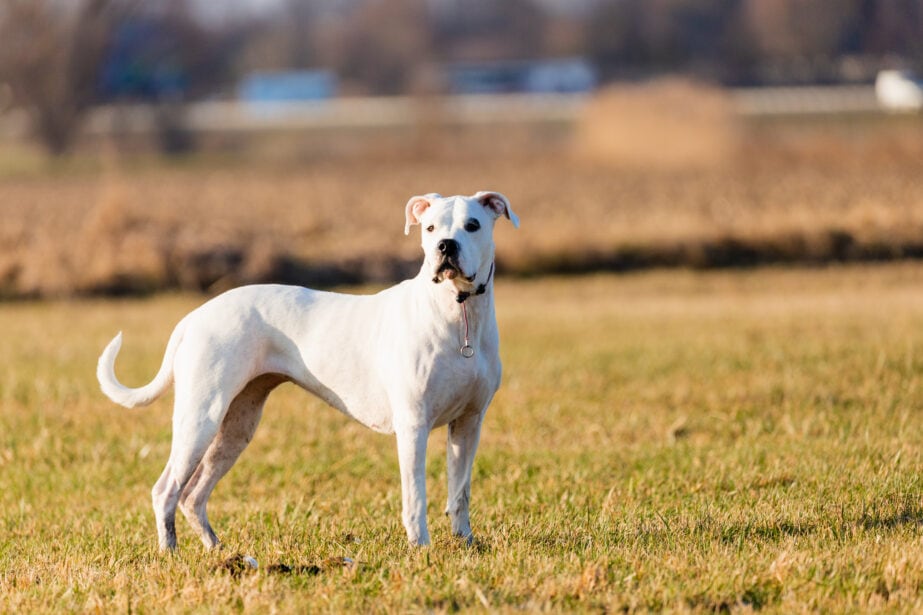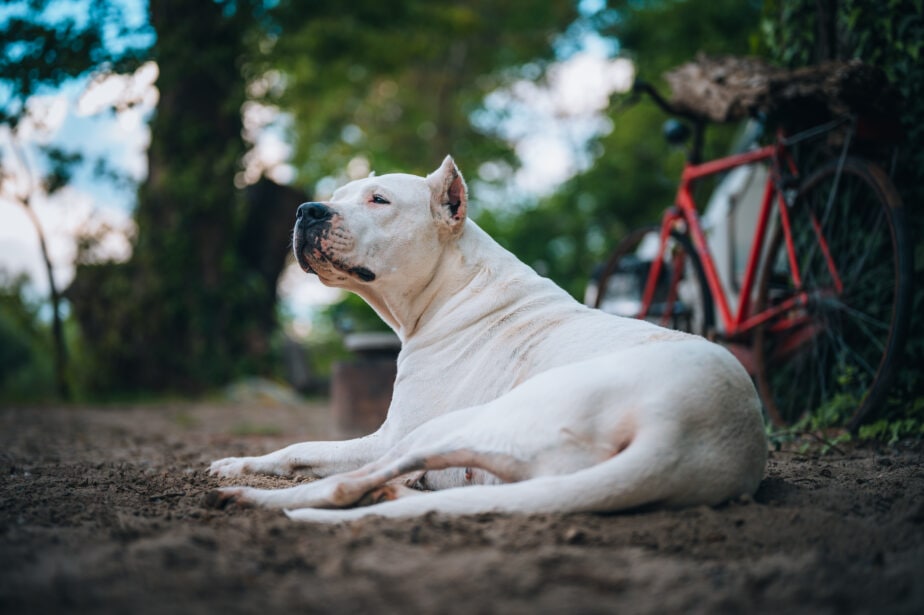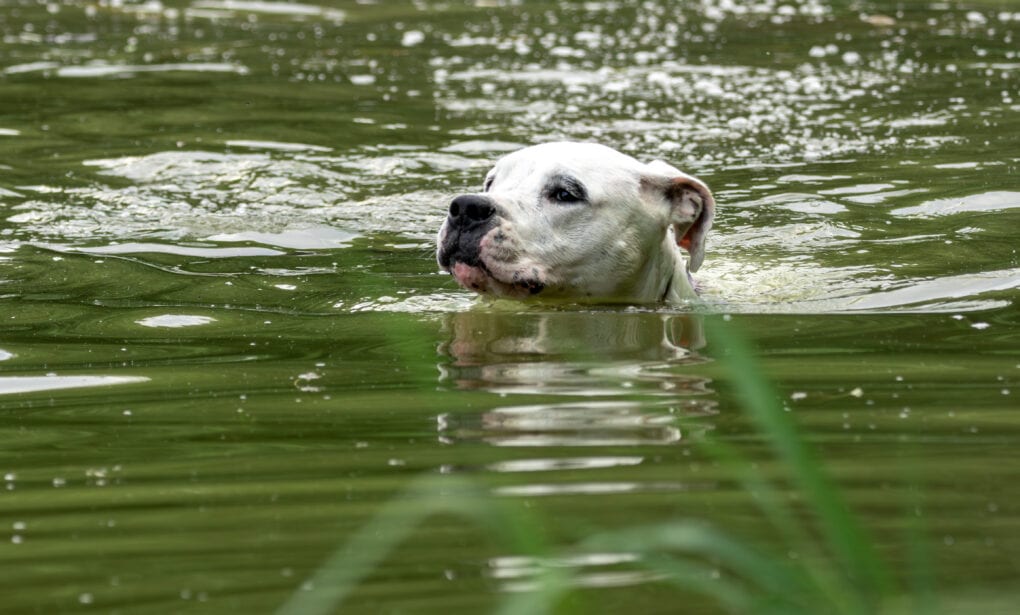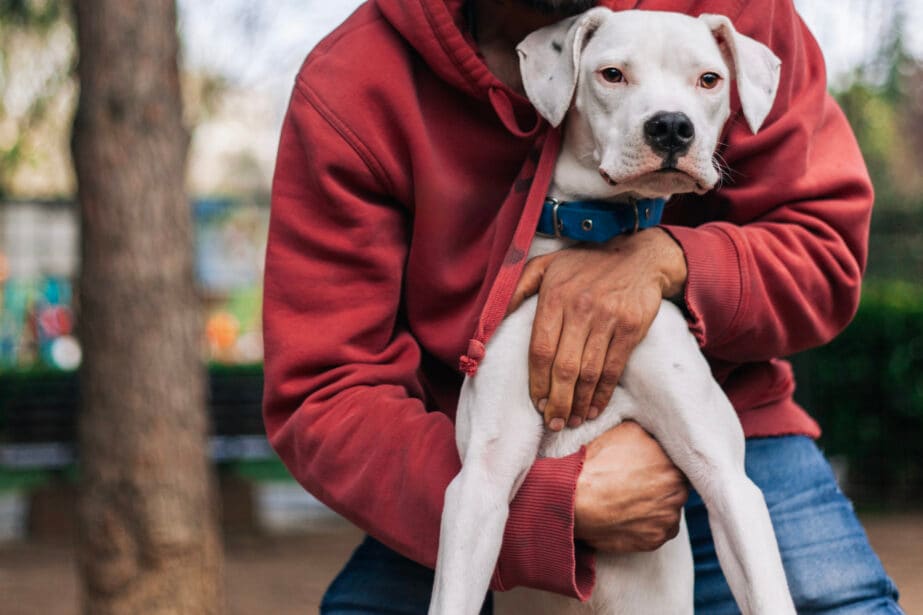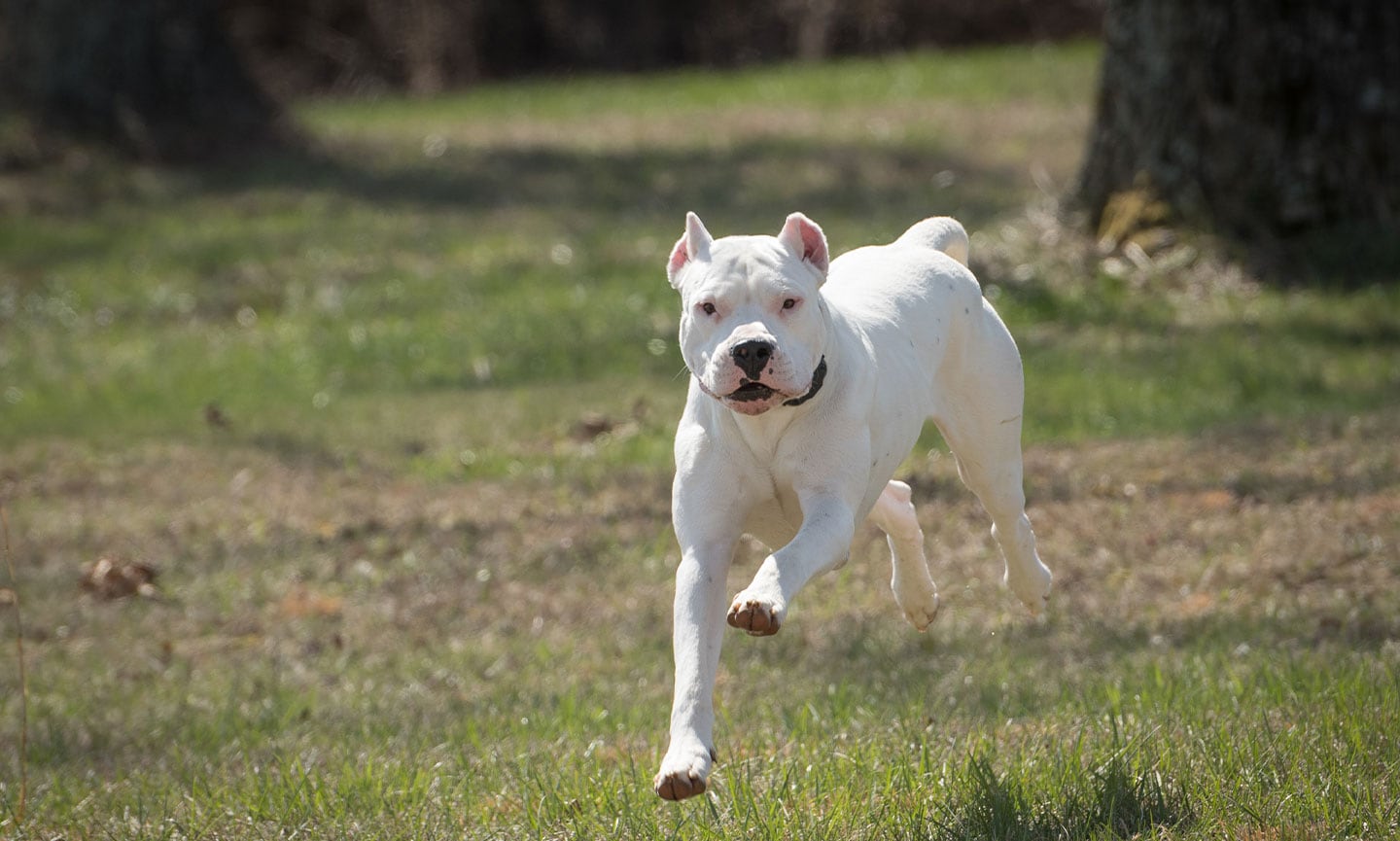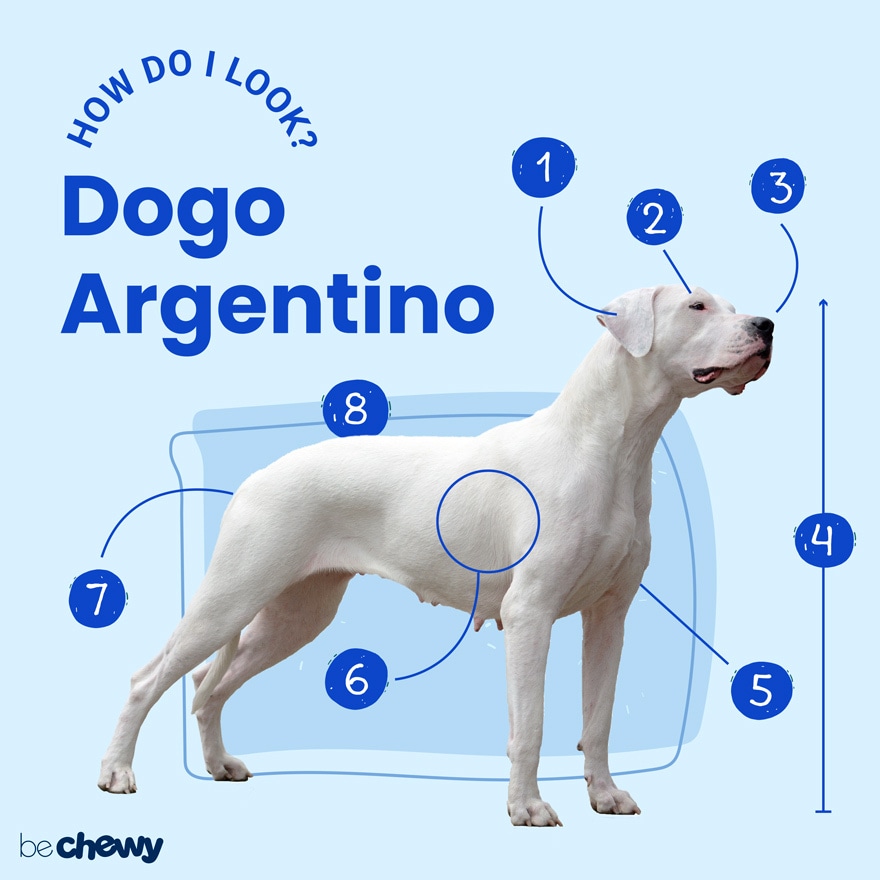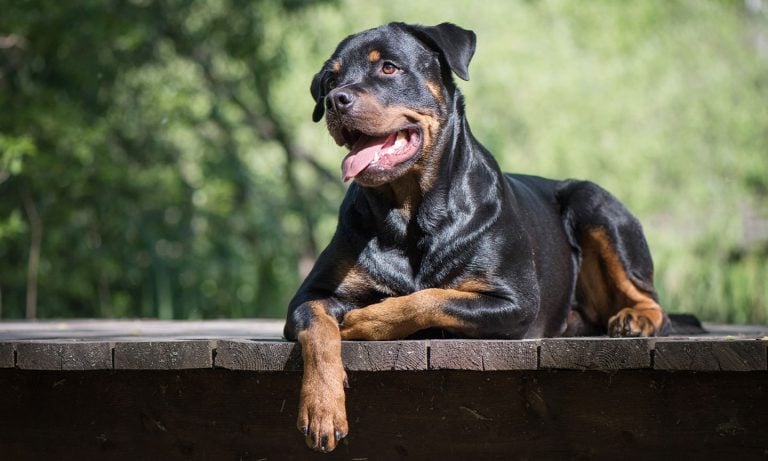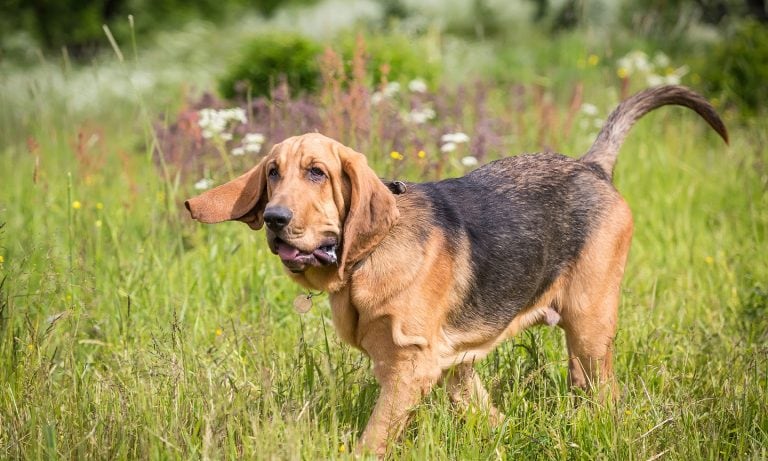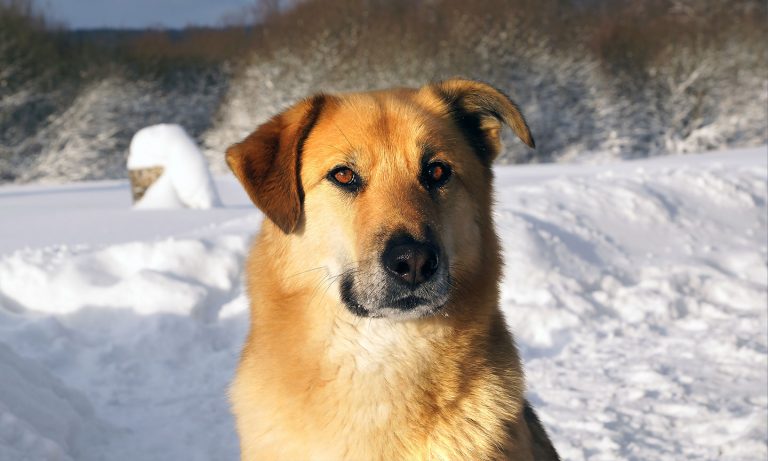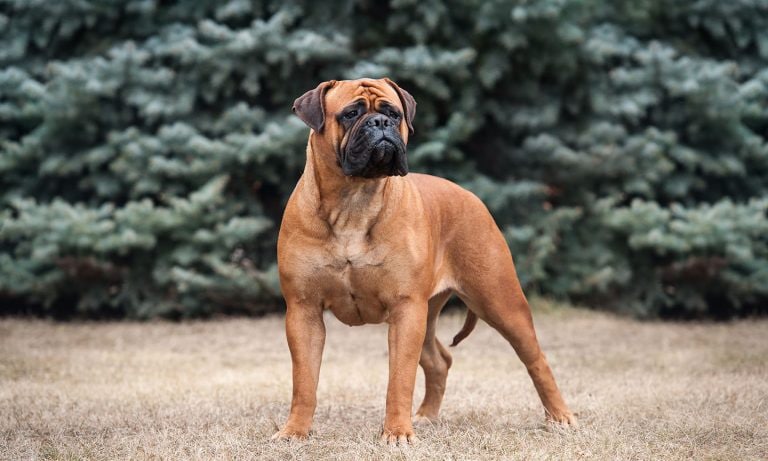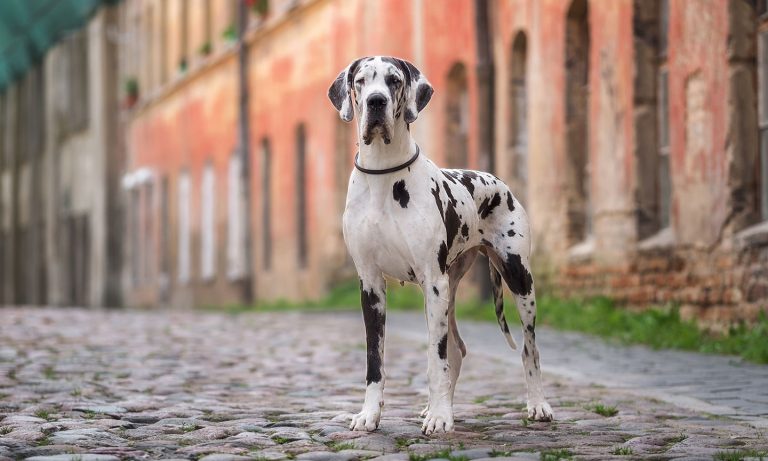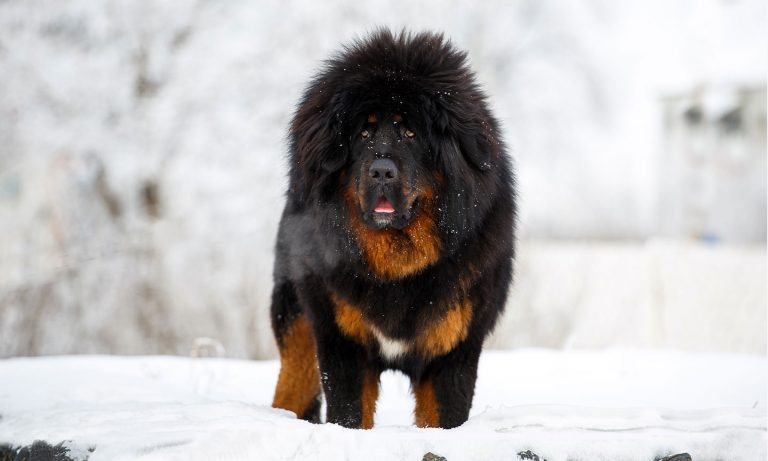Dogo Argentinos were bred to hunt wild boar, but today these big, burly pups excel as loyal companions. They may be wary of strangers, but after initial introductions, they’re ready to mingle and party all night long, if you let them. (With all their energy, they can outlast anyone on the dance floor.)
Breed Snapshot
Temperament:
AthleticStrong-WilledFearlessAdventurousCoat Color:
White
Best For
Dogo Argentinos, powerful and loyal, thrive on strong leadership and regular exercise. Their assertive personality and adventurous nature make them ideal companions for pet parents who can give them plenty of space to run and play.
Dogo Argentino Temperament
Bred for hunting wild boars and other large animals in the forests of Argentina, the Dogo Argentino breed is athletic with an energy level to match. These dogs were built for speed, so just one walk around the neighborhood isn’t going to cut it.
Argentinos are loyal and fearless; they wouldn’t give a second thought to putting themselves in between you and danger. But they’re not without a soft candy center, either. While not as aloof as the Cane Corso, they can be friendly with guests (of the human variety) as long as they’re properly trained and socialized, and they enjoy a rousing game of hide-and-seek with their family.
How to Care for a Dogo Argentino
From their Tough Guy exterior, these dogs look low maintenance, but the upkeep of a Dogo has way less to do with their grooming needs and everything to do with keeping up with a very large and active dog.
Dogo Argentino Health
Dogo Argentinos have a lifespan of 9 to 15 years, and they don’t have a lot of health issues. There are a few health problems that you should be aware of, so you can help your pup live the happiest and healthiest life possible.
- Congenital Deafness: Dogo Argentinos can suffer from hereditary congenital deafness in one or both ears. One recent study found that partial or total deafness affected as many as 25% of Dogos. This condition was often associated with a white pigmentation or coat and was more prevalent in dogs without a color patch, as well as blue-eyed dogs. Genetic screening testing is available, so be sure to ask your breeder. If your pup is partially or fully deaf, no worries! A deaf Dogo can still lead a full, happy life as a pet.
- Skin Issues: Their short white coat is beautiful, but it also makes the Dogo Argentino more susceptible to sunburn. The breed can also experience skin sensitivities from allergies (food and seasonal) or underlying health conditions. If you notice redness or a rash on your Dogo, your vet can determine exactly what you’re dealing with and how best to treat it.
- Joint Problems: As with other large-breed dogs, the Dogo Argentino is at a greater risk for hip dysplasia and joint issues in the elbows or knees. Joint supplements, pain medication and, in severe cases, surgery may be used as treatment.
- Hypothyroidism: This condition occurs when the thyroid gland doesn’t work properly, and the dog’s metabolism slows down. The Dogo Argentino can be more susceptible to this hormonal imbalance than other breeds. Your vet can diagnose your pup with a test, and prescribe treatment options, such as prescription medication, to regulate their thyroid levels.
Dogo Argentino History
The Dogo Argentino’s origins are relatively recent—1928 Argentina to be exact. Created by Dr. Antonio Nores Martinez, the Dogo Argentino’s bloodline includes the Great Dane, Pointer, Bull Terrier, Boxer, Bulldog, Pyrenean Mastiff, Irish Wolfhound, Spanish Mastiff and the Old Fighting Dog from the Córdoba province. Nores Martinez, an avid hunter, quickly realized the Dogo’s capacity for catching large, dangerous game such as wild boar and puma.
The Dogos are still used as hunting dogs in both Argentina and in rural parts of the US. Often, Texas farmers will use Dogos for hunting the wild boar that overrun their farms and devastate crops. And they’re ideal for this job; not only are they more than capable, these agile dogs do far less damage to the farmland than machinery or vehicles would.
The Dogo Argentino is one of the newest breeds recognized by the American Kennel Club. While their parent breed club, the Dogo Argentino Club of America, formed in 1985, the Dogo joined the ranks of the AKC in 2020.
Looking to add the Dogo Argentino to your family? You can find a responsible breeder at the AKC’s website. A puppy can cost upwards of $1,000, but for that, you’re likely getting a puppy who’s been screened for health issues, and you may get pedigree papers. You can also keep an eye out for the breed at a local animal shelter or Dogo Argentino rescue, or search Chewy’s database of adoptable dogs in your area.
FAQs
Are Dogo Argentinos hypoallergenic?
No, Dogo Argentinos are not considered hypoallergenic. While Dogos have short fur, they do shed, and that plus dander equals trouble for allergy sufferers.
Are Dogo Argentinos good family dogs?
Dogo Argentinos can be good family dogs. A well-trained and socialized Dogo can be a loving fur sibling to kids who have been taught how to respectfully interact with dogs.
What are the most popular Dogo Argentino names?
The most popular Dogo Argentino names include Max, Rocky, Ghost, Jack, Milo, Paco, Oscar, Leo, Zeus, Molly, Bella, Coco, Neva, Luna, Freya, Rosie, Mia, Layla and Lulu. Get more dog names here.
What are the most common Dogo Argentino mixes?
The most common Dogo Argentino mixes are:
- Dogo Argentino-Pit Bull mix (Dogo Argentino Pitbull)
- Dogo Argentino-Rottweiler mix (Dogo Argentino Rottweiler)
- Dogo Argentino-Cane Corso mix (Dogo Argentino Cane Corso)
- Dogo Argentino-Husky mix (Dogo Argentino Husky)
- Dogo Argentino-Lab mix (Dogo Argentino Labrador)
- Dogo Argentino-Doberman mix (Dobie Argentino)
Note: These are not purebred dogs but mixed breeds.
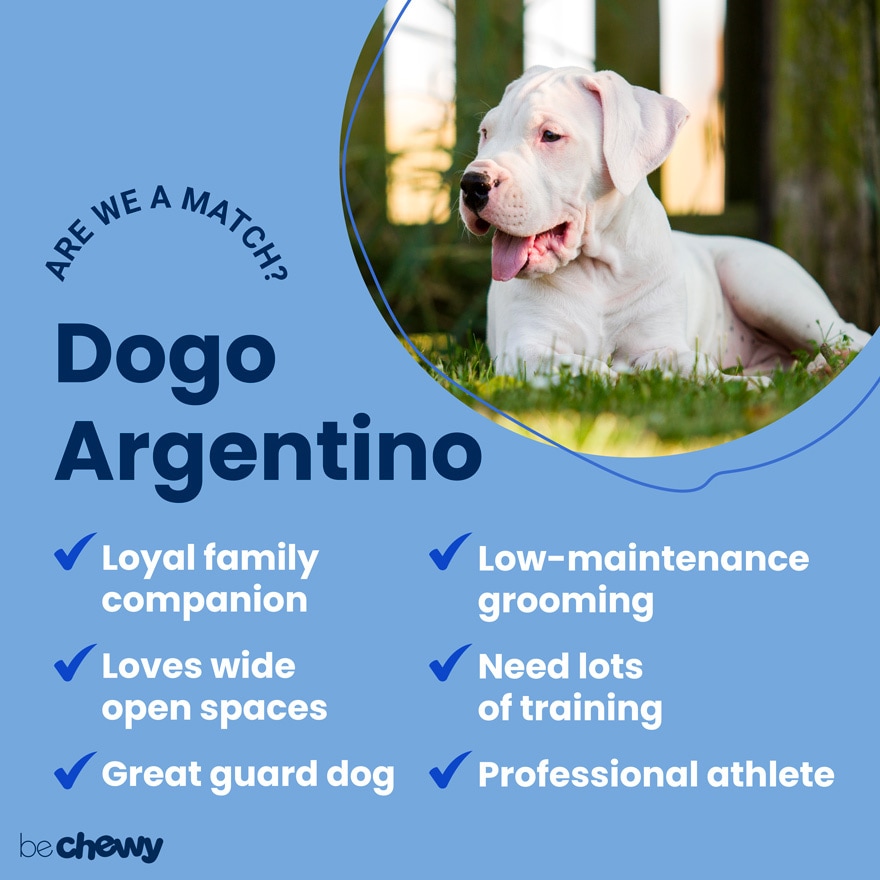
Top Takeaways
The Dogo Argentino dog might not be for everyone, but those who are game to take on the physical and mental needs of this impressive breed will find a fiercely loyal—and absolutely fun!—confidant. This high-energy, yet low-maintenance breed is most at home with an active explorer who has ample space and time to dedicate rather than a 9-to-5-er who is looking for a low-key cuddle buddy. Yet, give any Dogo a job and lots of exercise, and you’ll find they’re just as ready to take a mid-afternoon nap by your side.
Expert input provided by emergency vet tech Kathleen McLaughlin, who is the education coordinator for the Dogo Argentino Club of America, and certified dog trainer Jennifer Herrera, MA, CPDT-KA, CDW, of Hudson Barks.
Breed characteristic ratings provided by veterinarian Dr. Sarah J. Wooten, DVM, CVJ, a veterinarian at Sheep Draw Veterinary Hospital in Greeley, Colorado; dog trainer and behavior consultant Irith Bloom, CPDT-KSA, CBCC-KA, CDBC, owner of The Sophisticated Dog, LLC, in Los Angeles; and certified animal behavior consultant Amy Shojai, CABC, in Sherman, Texas.
The health content was medically reviewed by Chewy vets.

Search for Adoptable Dogo Argentinos Near You
Female Names
- Luna
- Bella
- Nova
- Harley
- Arya
- Lola
- Nala
- Xena
- Luna
- Lily
Male Names
- Ghost
- Zeus
- Apollo
- Odin
- Thor
- Loki
- Kane
- Maximus
- Duke
- Zeus
Share:
